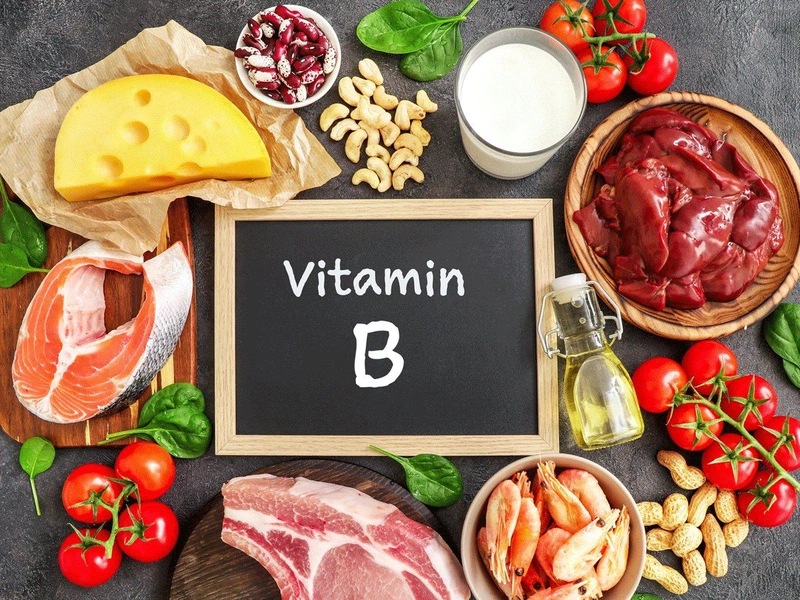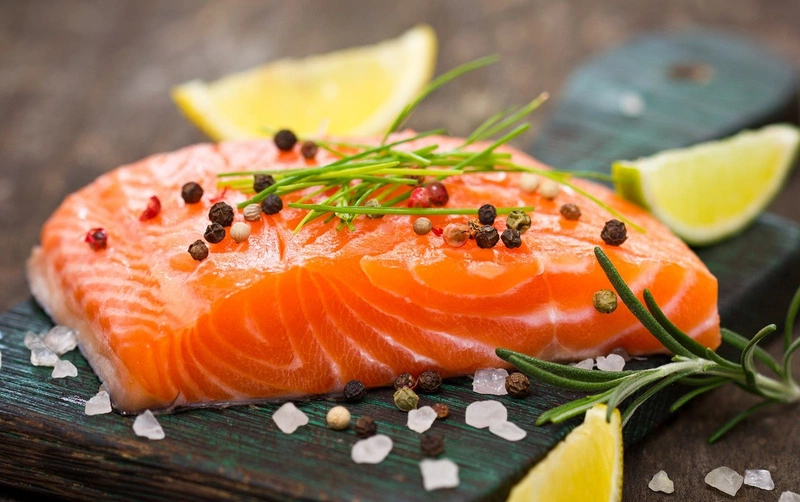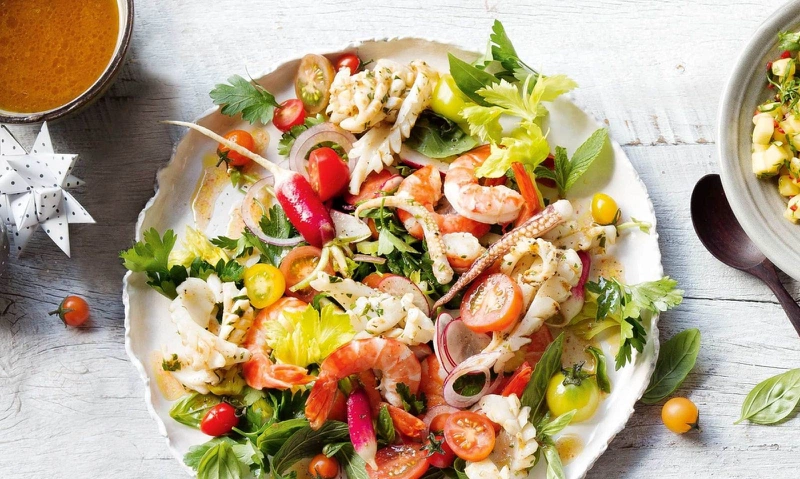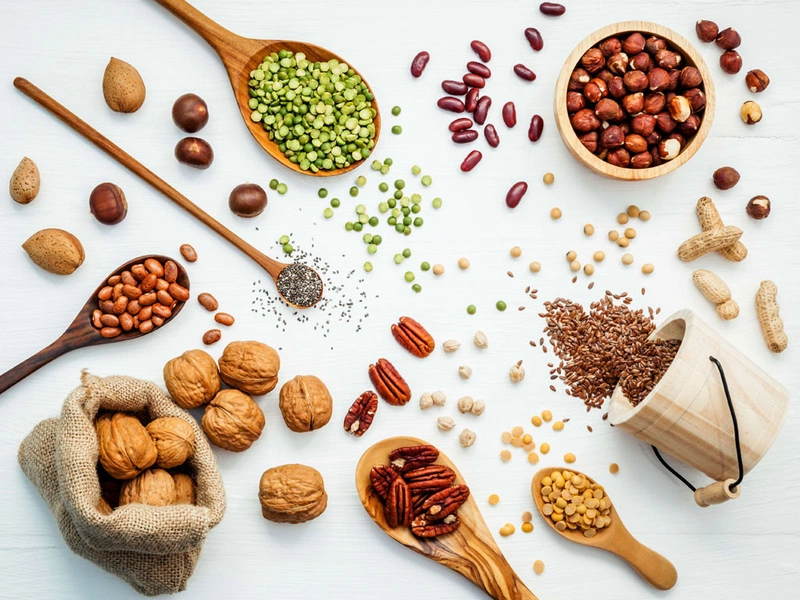B vitamins contribute a lot to the body’s activities, they are abundant in foods rich in vitamin B such as salmon, meat, eggs, … So what other foods contain vitamin B? Let’s find out with the pharmacy right away!
B vitamins are water-soluble vitamins, including many different types of vitamins such as vitamin B1, B6, B12. Each of these vitamins has its own role, but overall they are all necessary for the body’s activities. Let’s learn about B vitamins as well as which foods contain vitamin B.

What foods contain vitamin B? They are present in the foods we eat every day.
What is the role of vitamin B?
Vitamin B is a combination of sub-vitamins that are likened to a powerful army that contributes to many fronts to help the body develop healthily, from the outside to the inside.
Specifically, vitamin B affects the metabolism and development of the nervous system. This vitamin is also a necessary “conductor” in the metabolism of sugar, protein and fat to provide for the growth of the body, regulating chemical reactions of enzymes or proteins. It also maintains the development of skin, hair, nerve fibers, blood cells, immune system, endocrine glands and digestive system.
Foods rich in vitamin B are recommended for regular use because they account for 20% of the body’s daily needs
Suggestions for foods containing vitamin B?
Salmon, meat, animal liver
Meat, fish and animal liver are abundant sources of vitamin B. Among them, animal liver is considered a food that contains almost all types of B vitamins. Chicken meat is rich in vitamins B3 and B6. Salmon also has a variety of types such as B1, B2, B3, B5, B6, B12.

Salmon is a food rich in vitamin B.
Salmon is an extremely nutritious food. It is not for nothing that salmon sashimi is popular in many places around the world.
A 100g serving of cooked salmon contains:
- Vitamin B1: 18% RDI
- Vitamin B3: 50% RDI
- Vitamin B6: 47% RDI
- Vitamin B12: 51% RDI
In addition to being a vitamin-rich food, salmon is also rich in beneficial omega-3 fats, as well as protein and the mineral selenium.
Milk and dairy products
You can get a variety of trace elements into your body with milk and dairy products. For example, yogurt is rich in vitamins B2 and B12.
Most yogurts contain sugar, because this is a favorite food of bacteria. So use it in moderation.
Many studies have also shown that supplementing vitamin B through milk and dairy products is better than meat and animal liver.
A 240ml cup of milk will contain 26% of the RDI of vitamin B2 and a small amount of other B vitamins:
- Vitamin B1: 7% of the RDI
- Vitamin B2: 26% of the RDI
- Vitamin B5: 9% of the RDI
- Vitamin B12: 18% of the RDI
Seafood
If you are looking for vitamin B in foods, you definitely cannot ignore seafood, especially shellfish such as mussels, clams, oysters are extremely rich in vitamins B2, B12 and small amounts of vitamins B1, B3. They also provide the body with some minerals such as zinc, iron, selenium, manganese and are also a good source of Omega-3.

Vitamin B is abundant in seafood, especially shellfish.
Nutritional yeast and brewer’s yeast
Nutritional yeast and inactivated brewer’s yeast are often used to make bread or add flavor to dishes. But they are also a source of vitamin B for the body. People on a vegan diet are often deficient in vitamin B12 because it is almost exclusively present in foods of animal origin. Therefore, nutritional yeast is considered a solution to compensate for B12 for this group. The somewhat cheese-like flavor of yeast makes it popular as a spice. You can add it to salads or cook it with pumpkin soup.
Nuts
If you are looking for foods rich in vitamin B5, don’t miss the list of nuts. Sunflower seeds can be considered the best choice because they provide a lot of pantothenic acid (B5). Just 28 grams of sunflower seeds contain 20% of the RDI of pantothenic acid (B5). They also provide B3, B6 and B9.

Beans are a rich source of B vitamins.
Legumes
Legumes are the most notable foods because they contain high levels of folate (B9), as well as providing small amounts of other B vitamins such as thiamine (B1), riboflavin (B2), niacin (B3), pantothenic acid (B6). In addition, beans also help supplement fiber, which is good for the digestive system and prevents constipation.
Fortified cereals
Cereal is an easy-to-prepare food that is very beneficial for health. Not only does it provide abundant fiber, but cereals also supplement many B vitamins such as B1, B2, B3, B6, B9 and B12.
You can use whole grains or buy fortified cereal products that are pre-processed in packages for breakfast every day. Because this type contains a lot of sugar and is a refined grain, you should pay attention to choose the type with less than 5 grams of sugar per serving.
Each serving of cereal (28g) provides:
- Vitamin B1: 25% RDI
- Vitamin B2: 2% RDI
- Vitamin B3: 25% RDI
- Vitamin B6: 25% RDI
- Vitamin B9: 50% RDI
Green leafy vegetables
Consuming a variety of fruits and vegetables every day will provide your body with a variety of essential vitamins and minerals. In particular, dark green vegetables are considered foods rich in vitamin B, which are very good for health. In particular, they have a high content of vitamin B9. You should note that vitamins in general and vitamin B9 in particular are easily destroyed by heat during cooking. Therefore, to reduce the amount of vitamin loss, you should choose to steam instead of boil or stir-fry.





